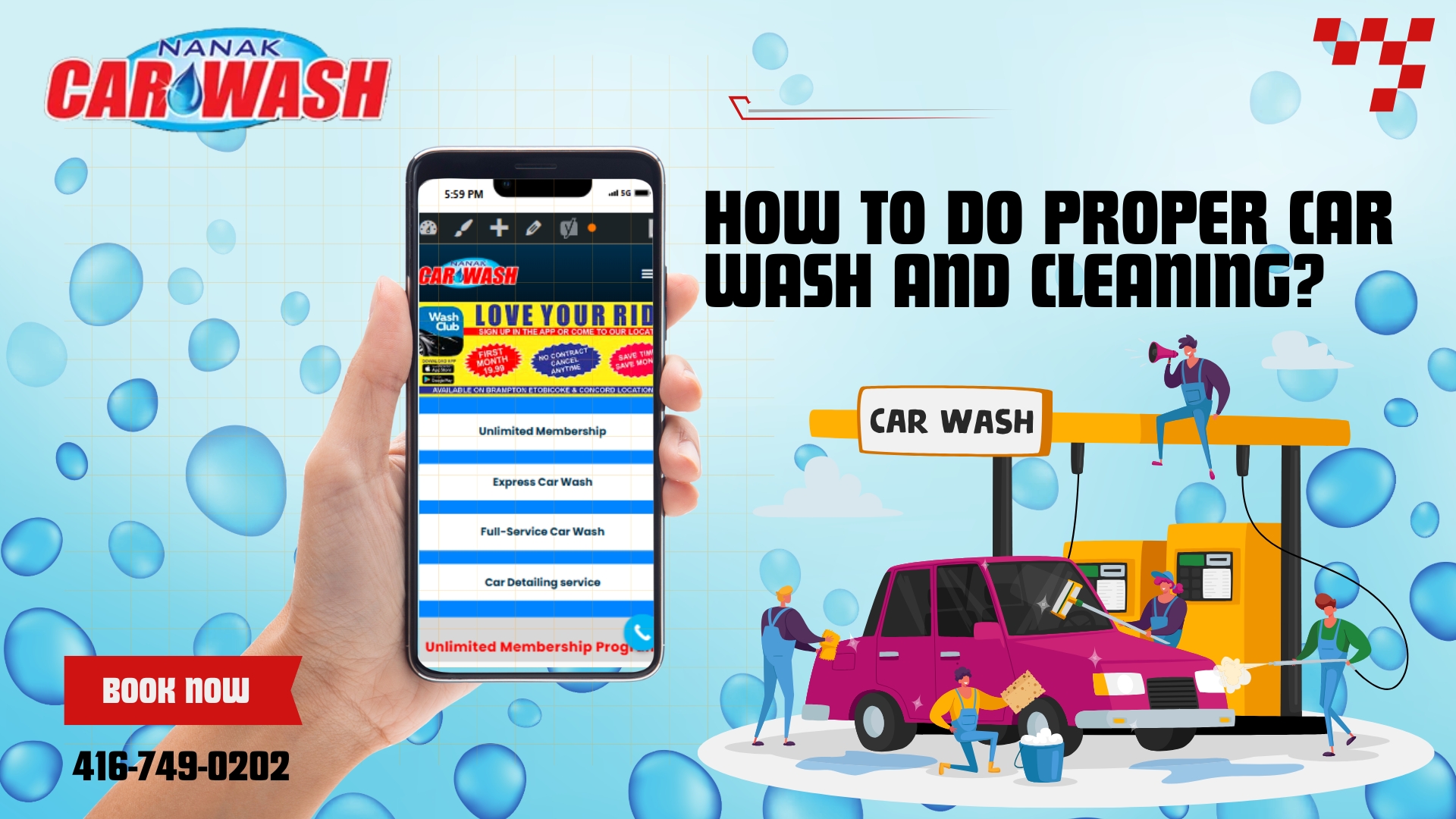Is your car looking a little worse for wear? Regularly washing your car may seem like a tedious chore, but it’s actually an important part of car maintenance. Not only does it keep your vehicle looking shiny and new, but it also has several other benefits that you might not be aware of. In this article, we will explore the importance of regularly washing your car and provide you with some helpful tips to get the job done effectively.
One of the primary benefits of washing your car regularly is the preservation of its paintwork. Over time, dirt, dust, and other contaminants can accumulate on the surface of your car, leading to scratches and damage. By cleaning your car regularly, you can prevent these issues and maintain its resale value.
Regular car wash can also help you identify any potential problems. By inspecting your vehicle closely during the cleaning process, you can spot any early signs of rust, dents, or leaks. This allows you to address these issues promptly and avoid more extensive and costly repairs down the road.
So, if you want to keep your car looking its best and ensure its long-term durability, make sure to prioritize regular car washes. In the following sections, we will provide you with some expert tips to make the process easier and more effective.
Why is car washing important?
Regularly washing your car is essential for several reasons. First and foremost, it helps to preserve the paintwork on your vehicle. Over time, dirt, dust, and other contaminants can accumulate on the surface, leading to scratches and damage. By cleaning your car regularly, you can prevent these issues and maintain its resale value.
Another key reason to wash your car regularly is to identify potential problems. When you clean your vehicle, you have the opportunity to inspect it closely. This allows you to spot any early signs of rust, dents, or leaks. By addressing these issues promptly, you can avoid more extensive and costly repairs down the road.
Benefits of regularly washing your car
The impact of dirt and grime on your car’s paintwork
Dirt and grime may seem harmless, but they can have a significant impact on your car’s paintwork. When left unattended, these contaminants can gradually wear down the protective clear coat, leaving your car vulnerable to scratches and UV damage. Regular car washes help to remove these harmful substances, keeping your paintwork in pristine condition.
How car washing improves visibility and safety
Have you noticed a decrease in visibility while driving? Dirty windows and mirrors can significantly impair your ability to see clearly, especially during adverse weather conditions. Regularly washing your car ensures that your windows and mirrors are clean, improving visibility and overall safety on the road.
Preventing rust and corrosion with regular car washing
Rust is the enemy of any vehicle. It weakens the structure, compromises safety, and decreases the value of your car. By washing your car regularly, you can prevent rust and corrosion from forming. Removing road salt, bird droppings, and other corrosive substances promptly can go a long way in preserving the integrity of your vehicle.
The impact of dirt and grime on your car’s paintwork
Now that you understand the importance of regularly washing your car, let’s dive into some expert tips to make the process easier and more effective when you do it at home.
Choosing the right car washing products and equipment
When it comes to washing your car at home, using the right products and equipment is crucial. Opt for a high-quality car wash soap that is specifically formulated for automotive use. Avoid using household cleaners or dish soap, as they can strip away the protective wax on your car’s surface. Additionally, invest in a microfiber wash mitt or sponge, as they are gentle on paintwork and help to prevent scratches.
The proper technique for washing your car
To ensure a thorough and effective car wash, follow these steps:
1. Begin by rinsing your car thoroughly with a hose to remove any loose dirt and debris. This step helps to avoid scratching the paint during the washing process.
2. Fill a bucket with water and the recommended amount of car wash soap. Dip your wash mitt or sponge into the soapy water and start washing your car from top to bottom, working in sections. Remember to rinse your mitt or sponge frequently to avoid spreading dirt.
3. After washing each section, rinse it off with clean water to remove any soap residue.
4. Once you have finished washing the entire car, give it a final rinse to ensure all soap is removed.
Drying and finishing touches
After the car wash, it’s important to dry your vehicle properly. Use a microfiber drying towel to gently remove excess water. Avoid using a regular towel or chamois, as they can leave behind lint or swirl marks.
Finally, consider applying a coat of wax or sealant to protect your car’s paintwork and give it a glossy finish. Follow the product instructions for the best results.
How car washing improves visibility and safety
While washing your car at home can be a rewarding task, sometimes it’s beneficial to seek professional car washing services. Here are a few advantages of opting for professional car washes:
Time-saving and convenience
Professional car washes often offer a range of services, from basic washes to comprehensive detailing packages. This saves you time and effort, allowing you to focus on other important tasks.
Expertise and equipment
Professional car washes have the knowledge and experience to clean your car effectively. They also have access to specialized equipment and products to ensure a thorough and safe car wash.
Environmental considerations
Professional car washes are designed to be environmentally friendly. They use less water and often recycle the water used in the wash process. This helps to conserve water resources and reduce pollution.
Preventing rust and corrosion with regular car washing
The frequency of car washing depends on various factors, including your location, driving habits, and weather conditions. As a general rule, it’s recommended to wash your car every two weeks to remove dirt and contaminants. However, if you live in an area with harsh weather conditions or frequently drive on dusty roads, you may need to wash your car more frequently.
Tips for effectively washing your car at home
Regularly washing your car is not just about keeping it looking shiny and new. It is an essential part of car maintenance that helps to preserve its value, prevent damage, and maintain your safety on the road. By following the tips provided in this article, you can effectively wash your car at home or opt for the convenience of professional car washing services. So, make sure to prioritize regular car washes and enjoy the benefits of a clean and well-maintained vehicle.
Remember, keeping your car clean doesn’t have to be a daunting task. With the right knowledge and tools, you can easily maintain your car’s appearance and protect its longevity. So, roll up your sleeves, grab a bucket of soapy water, and give your car the care it deserves. Happy washing!br/>
Choosing the right car washing products and equipment
When it comes to washing your car at home, there are a few key tips to keep in mind. First and foremost, make sure to use a dedicated car wash shampoo. This is important because regular household detergents can be too harsh and strip away the protective wax on your car’s paint. Look for a pH-balanced shampoo that is specifically designed for automotive use.
Next, start with the wheels and tires. These areas tend to accumulate the most dirt and grime, so it’s best to tackle them first. Use a separate sponge or brush to clean the wheels and make sure to get into all the nooks and crannies. Once the wheels are clean, move on to the rest of the car.
When washing the body of your car, it’s important to use the two-bucket method. Fill one bucket with clean water and another with the car wash shampoo mixed with water. Dip your sponge or wash mitt into the soapy water, then wash one section of the car at a time, rinsing your sponge or mitt in the clean water bucket before reapplying the soap. This helps to prevent dirt and debris from being transferred back onto the car’s surface.
After washing, make sure to thoroughly rinse your car to remove any remaining soap residue. This is especially important if you live in an area with hard water, as the minerals in the water can leave behind spots and streaks. Use a hose with a nozzle attachment or a pressure washer for a thorough rinse.
Finally, to prevent water spots, dry your car immediately after washing. You can use a microfiber towel or a soft chamois to gently dry the surface. Start from the top and work your way down, making sure to pay attention to the windows and mirrors.
By following these tips, you can ensure that your car is thoroughly cleaned and protected.
The benefits of professional car washing services
When it comes to choosing the right car washing products and equipment, it can be overwhelming with the numerous options available in the market. However, there are a few key factors to consider that can help you make the best choice.
Firstly, opt for a high-quality car wash shampoo. As mentioned earlier, using regular household detergents can be too harsh and strip away the protective wax on your car’s paint. Look for a shampoo that is pH-balanced and specifically formulated for automotive use. This will ensure that your car’s paintwork is not damaged during the washing process.
In addition to the car wash shampoo, invest in a good quality microfiber wash mitt or sponge. These are gentle on your car’s surface and help to minimize the risk of scratches. Avoid using abrasive brushes or sponges, as they can leave behind swirl marks and damage the paint.
When it comes to drying your car, microfiber towels are your best bet. They are highly absorbent and won’t leave lint or scratches on the surface. Avoid using regular towels or chamois, as they can be abrasive and cause damage.
Lastly, consider using a wax or sealant after washing your car. This will provide an extra layer of protection and help to maintain the shine. There are different types of waxes available, including spray-on waxes and paste waxes. Choose one that suits your preferences and follow the instructions on the packaging for best results.
By choosing the right car washing products and equipment, you can ensure that your car is cleaned effectively without causing any damage.
How often should you wash your car?
While washing your car at home can be a cost-effective option, there are several benefits to opting for professional car washing services. Professional car washes have the equipment, expertise, and knowledge to ensure that your car is cleaned thoroughly and safely.
One of the major benefits of professional car washes is the use of high-pressure washers. These washers can effectively remove dirt, grime, and contaminants from your car’s surface, including hard-to-reach areas. Additionally, professional car washes often use specialized cleaning products that are designed to be gentle on your car’s paint while still providing a thorough clean.
Another advantage of professional car washes is the time saved. Washing your car at home can be a time-consuming task, especially if you have a large vehicle or if it’s been a while since your last wash. Professional car washes can get the job done quickly and efficiently, allowing you to focus on other tasks.
Professional car washes also offer additional services such as waxing, polishing, and interior cleaning. These services can help to restore your car’s shine and protect its paintwork. Additionally, many car washes offer loyalty programs or packages that can provide additional savings over time.
Ultimately, the choice between washing your car at home or using professional services depends on personal preference and convenience. However, professional car washes offer several benefits that can make them a worthwhile investment.
Conclusion: The importance of maintaining a clean and well-maintained car.
Now that we’ve covered the importance of washing your car and provided some tips for effective cleaning, you might be wondering how often you should wash your car. The frequency of car washes depends on various factors, including your location, driving conditions, and personal preferences.
As a general rule of thumb, it’s recommended to wash your car at least once every two weeks. This helps to remove dirt, dust, and other contaminants that can accumulate on the surface. However, if you live in an area with harsh weather conditions or if you frequently drive on dusty or muddy roads, you may need to wash your car more often.
It’s also important to consider the season when determining the frequency of car washes. During the winter months, road salt and other de-icing chemicals can wreak havoc on your car’s paintwork. In this case, it’s advisable to wash your car more frequently to remove these corrosive substances.
In addition to regular washes, it’s a good idea to give your car a thorough cleaning at least once every three months. This includes waxing, polishing, and interior cleaning. These additional steps help to protect your car’s paintwork and maintain its overall appearance.






